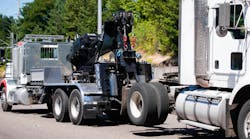It looks like we're going to avoid most of the pain and all of the confusion that surrounded the October 2002 deadline for diesel engine emissions reductions when the next round takes effect in 2007.
Make no mistake about it — the '07 levels and those that follow them in '10 will be the most stringent in the world. Even the EPA, which set those levels, admits it's “a big deal.”
Despite the size of the challenge, there is good reason for optimism. Last month, all of the engine manufacturers finalized the technologies they'll use to achieve the '07 levels. In each case, they'll stick with the cooled EGR or fuel controls they devised to meet '02 standards and add a particulate filter in the exhaust stream. No significant new technological development is required.
Better still, all expect to have production prototypes of their '07 engines ready for fleet testing by the middle of next year, giving the industry a full winter/summer cycle to see how they perform.
Fuel suppliers are also on target to have the ultra-low sulfur diesel needed to run '07 engines in the distribution chain by '06. It's now estimated that by '07, 95% of all diesel sold for on-highway use will be the ultra-low sulfur spec, greatly reducing the possibility that the wrong diesel will get into the new engines and adversely affect their particulate filters.
However, there is one significant negative associated with the '07 emissions levels: cost, both initial and operational. Estimates vary widely, but it's safe to say the initial cost increase will be substantial, probably in the high four figures.
That has both the government and truck manufacturers worried that fleets will pre-buy large numbers of trucks in '06 to avoid the price increase. And significant pre-buy will limit air-quality gains from the '07 levels since fewer of the cleaner trucks will be out running on the road.
The General Accounting Office has suggested that Congress could avoid that scenario by offering fleets tax incentives to skip the pre-buy in '06 and invest in cleaner '07 models. ATA strongly, and loudly, supports that approach, calling for investment tax credits or bonus depreciation to offset financial penalties for buying trucks in '07.
While that may sound reasonable to those in trucking, my guess is that it won't be too popular with the general public or environmental groups, who will quickly characterize those incentives as paying the industry to live up to the law.
There may be a way around that perception, though. The 12% Federal excise tax on new truck sales has long been a sore point for the industry, and calls to remove what many see as an unfair tax burden have received a sympathetic hearing. Why not simply end the excise tax on Jan. 1, 2007? Legislators who favor tax reform could remove a levy that unfairly targets a single industry and at the same time foster improved air quality.
Sounds like a logical solution, although there would have to be some way to offset the revenues lost by ending the excise tax. Would new fuel or road-use taxes be fairer? Maybe, but the first step is getting through the '07 gate with the least economic disruption and the most environmental gain.
E-mail: [email protected]
Web site: fleetowner.com


